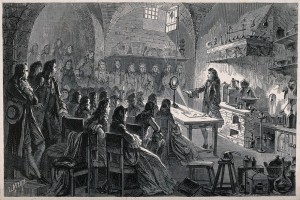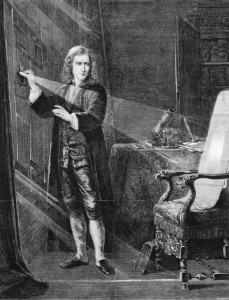How Isaac Newton Turned Isolation From the Great Plague Into a Year of Wonders

Sir Isaac Newton showing an optical experiment to an audience in his laboratory
“In 1665, “social distancing” orders emptied campuses throughout England, as the bubonic plague raged, killing 100,000 people. Isaac Newton, a 24-year-old student from Cambridge, was among those forced to leave campus and return indefinitely to his childhood home…Without his professors to guide him, Newton apparently thrived. At home, he built bookshelves and created a small office for himself, filling a blank notebook with his ideas and calculations. Absent the distractions of typical daily life, Newton’s creativity flourished. During this time away he discovered differential and integral calculus, formulated a theory of universal gravitation, and explored optics, experimenting with prisms and investigating light…” Read the rest of the article here.
For in those days I was in the prime of my age for invention & minded Mathematics & Philosophy more than at any time since. –Isaac Newton
Rather than being a nadir, this “social distancing” experience could be the peak of your creativity and production. This could be the time when you formulate your greatest ideas and do your best work. This could be your year of wonders. –Kerry McDonald







